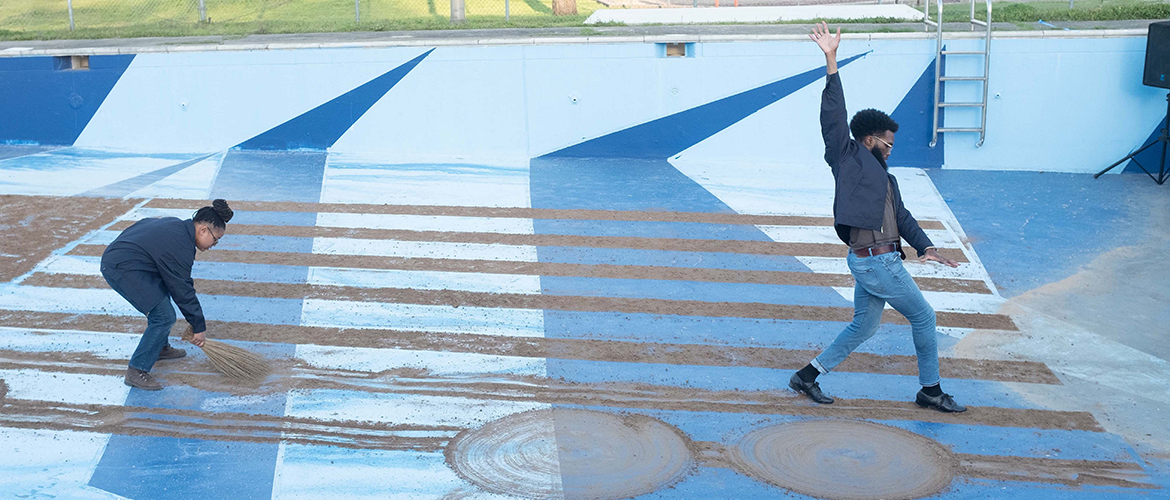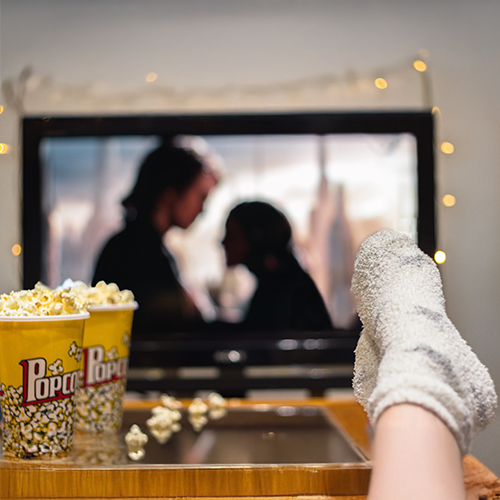
Growing up, artist Ariel René Jackson (they/them) spent summers and holidays on their grandparent’s Louisiana farm. As an adult, Jackson — far more interested in art than farming — wanted to explore how they inherited an embodied understanding of the land. That question has influenced much of the artist’s recent work, which will be on view at the Jacob Lawrence Gallery (JLG) from January 28 through February 23.
The exhibition is the culmination of Jackson’s 2021 Jacob Lawrence Legacy Residency. The UW School of Art + Art History + Design (SoA+AH+D) has awarded the residency annually since 2015, providing funding for Black artists to dedicate the month of January to working on their art on campus, leading to an exhibition in the gallery. The residency is funded by a National Endowment for the Arts grant and support from donors.
It’s like being told, ‘We hear what you’re saying, we believe in it, and we want to see you grow.’
Like most campus programs, the residency has adapted due to COVID-19. The selected artist usually spends the month of January on campus, with opportunities to interact with faculty and students informally, but Jackson has worked from home in Austin, Texas. Conversations with faculty, students, and the community remain an important part of the experience, but those conversations are scheduled in advance and presented online. Yet the spirit of the residency — which celebrates the legacy of renowned artist and UW art professor Jacob Lawrence — is unchanged.
“The gallery honors Jacob Lawrence not only through its name but also through programming that supports the development of new work by Black artists — work that has historically been undersupported financially,” says JLG director Emily Zimmerman. “The goal of the residency is to provide the time and space and financial resources for artists to do that work.”
Jackson has been grateful for the opportunity. “To have this kind of institutional backing has been incredible,” the artist says. “It has allowed me to revisit projects and think of new ways of approaching projects. As a Black female artist, the financial backing means a lot, but also the recognition. It’s like being told, ‘We hear what you’re saying, we believe in it, and we want to see you grow.’ We need more of that to encourage a diverse future in the arts.”

Some Jacob Lawrence Legacy residents have viewed the residency as a time to step away from current projects and create new work. Others have expanded on existing projects. For Jackson, the residency provided an opportunity to build on a video collaboration with tap dancer and long-time collaborator Michael J. Love, including a 2019 performance project they created for the George Washington Carver Museum in Austin.
“Michael is a performer and choreographer,” Jackson says. “He thinks about the performance aspect of a piece. I think in terms of narrative and storytelling. The residency has provided us with a platform to deepen ideas we were already thinking about, like lineage and generational change and transformation.” The current project also incorporates a song from New Orleans jazz musician Joe Dyson's first solo album.
A video installation will be part of the JLG exhibition of Jackson’s work, along with a series of panels related to the video. The panels incorporate soil as an artistic medium, referencing Jackson’s interest in land. “I started using soil in my work to be very direct with what I was pointing toward,” Jackson explains. “As I continued my research, I learned that George Washington Carver used soil for his paintings as well. He patented a couple of paint pigments made from soil, but most people are not familiar with that part of his legacy.”

Jackson will discuss these and other aspects of the residency project with students as a guest in a SoA+AH+D class and as part of a February 23rd panel discussion open to the general public. One topic Jackson plans to discuss is how research has influenced and inspired their artistic practice.
“Researching as an artist is different from academic research,” Jackson says. “It’s a different approach to information. I hope that by seeing my work and hearing about my process, students recognize that there are a variety of ways to be an artist.”
Due to COVID, options for visiting Jackson’s gallery show may be in flux — a situation that has become all too familiar. At various points in 2020, the Jacob Lawrence Gallery was open to all visitors; open only by appointment; open by appointment and limited to SoA+AH+D faculty, staff, and students; and closed entirely. For the current status, visit the Jacob Lawrence Gallery website.
Zimmerman assures that despite the year’s many challenges, the residency remains a cornerstone of the gallery’s work. As JLG director, she finds that providing opportunities for artists to create new work is her most satisfying role.
“I love supporting artists as they take the next step in their creative investigations,” Zimmerman says. “I think of my curatorial practice as closer to that of a producer who supports the production of new work than a curator who selects and hangs artwork. Artists are radically undervalued in our culture, and residency programs like the Jacob Lawrence Legacy Residency help support them in a time when they’re not very well supported. In my mind, it’s some of the most important work to be done.”
. . .
As of February 3, the Jacob Lawrence Gallery is open to the public for 30 minute, no-contact viewing appointments. All visits require a completed health attestation form and all visitors must wear masks. Check appointment availability.
A February 23rd livestream panel discussion featuring Ariel René Jackson, Michael J. Love, and others is free and open to the public. Learn more or register. The discussion will later be shared via the Jacob Lawrence Gallery Vimeo and the Northwest Film Forum’s online screening platform.
Learn how you can support the Jacob Lawrence Gallery and other SoA+AH+D programs.
More Stories

Bringing Music to Life Through Audio Engineering
UW School of Music alum Andrea Roberts, an audio engineer, has worked with recording artists in a wide range of genres — including Beyoncé.

A Healing Heart Returns
In February, the UW Symphony will perform a symphony that Coast Salish elder Vi Hilbert commissioned years ago to heal the world after the heartbreak of 9/11. The symphony was first performed by the Seattle Symphony in 2006.

Need a break from holiday movies? Try these
For those wanting a break from holiday movies, Cinema & Media Studies faculty and grad students offer suggestions.